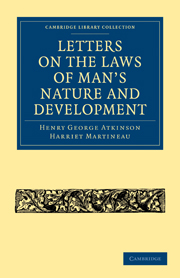Book contents
- Frontmatter
- Preface
- Mottoes
- Contents
- Letter. 1 Inquiry for a Basis
- Letter. 2 Proposal of a Basis
- Letter. 3 Preparation of the Ground
- Letter. 4 What is the Brain?
- Letter. 5 Inquiry about its Structure
- Letter. 6 Early days of Phrenology
- Letter. 7 Inquiry for New Discoveries
- Letter. 8 Methods of New Discovery. Organic Arrangement of the Brain
- Letter. 9 Illustrative Cases
- Letter. 10 Organic Arrangement of the Cerebrum
- Letter. 11 Dr. Howe's Report on Idiocy
- Letter. 12 The Senses and Nervous System
- Letter. 13 Illustrative Comment
- Letter. 14 Facts about the Senses under various conditions
- Letter. 15 Raising questions
- Letter. 16 Bacon, on Matter and Causation. Inferences and Dreams. Association of Ideas
- Letter. 17 Nothing
- Letter. 18 Knowledge and Notions. Results of each
- Letter. 19 Release from Notions. Entrance upon Knowledge
- Letter. 20 Natural History of Superstition
- Letter. 21 Theology and Science
- Letter. 22 Central Law and Pervasive Unity. Light. Sense of Identity. Ghost-seeing. Unrevealed Human Relations
- Letter. 23 Position and Privilege of Truth-seekers
- Letter. 24 Position and Privilege of Truth-speakers
- Appendix
Letter. 22 - Central Law and Pervasive Unity. Light. Sense of Identity. Ghost-seeing. Unrevealed Human Relations
Published online by Cambridge University Press: 29 August 2010
- Frontmatter
- Preface
- Mottoes
- Contents
- Letter. 1 Inquiry for a Basis
- Letter. 2 Proposal of a Basis
- Letter. 3 Preparation of the Ground
- Letter. 4 What is the Brain?
- Letter. 5 Inquiry about its Structure
- Letter. 6 Early days of Phrenology
- Letter. 7 Inquiry for New Discoveries
- Letter. 8 Methods of New Discovery. Organic Arrangement of the Brain
- Letter. 9 Illustrative Cases
- Letter. 10 Organic Arrangement of the Cerebrum
- Letter. 11 Dr. Howe's Report on Idiocy
- Letter. 12 The Senses and Nervous System
- Letter. 13 Illustrative Comment
- Letter. 14 Facts about the Senses under various conditions
- Letter. 15 Raising questions
- Letter. 16 Bacon, on Matter and Causation. Inferences and Dreams. Association of Ideas
- Letter. 17 Nothing
- Letter. 18 Knowledge and Notions. Results of each
- Letter. 19 Release from Notions. Entrance upon Knowledge
- Letter. 20 Natural History of Superstition
- Letter. 21 Theology and Science
- Letter. 22 Central Law and Pervasive Unity. Light. Sense of Identity. Ghost-seeing. Unrevealed Human Relations
- Letter. 23 Position and Privilege of Truth-seekers
- Letter. 24 Position and Privilege of Truth-speakers
- Appendix
Summary
H. G. A. to H. M.
How natural it was for men to use false similes! for instance, to liken to the making of a loaf of bread the material existence and growth of the corn out of which the bread was made. We are so apt to forget that man creates nothing; that to invent or make, is but to place materials in juxtaposition; and that Nature does all the rest! All the effects of Nature, and all the doings of Man, who is part of Nature, are the consequents of the interaction of matter, of the influence of body on body. Science has brought us to this; and we must not let the truth escape us. “The mind of Man,” says Bacon, “is like an enchanted glass; full of superstition and imposture, if it be not delivered and reduced.”— “Nay, it is not credible, till it be opened, what a number of fictions and fancies the similitude of human action and arts, together with making of Man comunis mensura, have brought into natural philosophy, not much better than the heresy of the anthropomorphites, bred in the cells of gross and solitary monks; and the opinions of Epicurus, answerable to the same in heathenism, who supposed the gods to be in human shape. And therefore, Velleius, the Epicurean, needed not to have asked why God should have adorned the heaven with stars, as if he had been an Ædilis; one that should have set forth some magnificent shows or plays.
- Type
- Chapter
- Information
- Letters on the Laws of Man's Nature and Development , pp. 251 - 281Publisher: Cambridge University PressPrint publication year: 2009First published in: 1851



